- News
- Reviews
- Bikes
- Components
- Bar tape & grips
- Bottom brackets
- Brake & gear cables
- Brake & STI levers
- Brake pads & spares
- Brakes
- Cassettes & freewheels
- Chains
- Chainsets & chainrings
- Derailleurs - front
- Derailleurs - rear
- Forks
- Gear levers & shifters
- Groupsets
- Handlebars & extensions
- Headsets
- Hubs
- Inner tubes
- Pedals
- Quick releases & skewers
- Saddles
- Seatposts
- Stems
- Wheels
- Tyres
- Tubeless valves
- Accessories
- Accessories - misc
- Computer mounts
- Bags
- Bar ends
- Bike bags & cases
- Bottle cages
- Bottles
- Cameras
- Car racks
- Child seats
- Computers
- Glasses
- GPS units
- Helmets
- Lights - front
- Lights - rear
- Lights - sets
- Locks
- Mirrors
- Mudguards
- Racks
- Pumps & CO2 inflators
- Puncture kits
- Reflectives
- Smart watches
- Stands and racks
- Trailers
- Clothing
- Health, fitness and nutrition
- Tools and workshop
- Miscellaneous
- Buyers Guides
- Features
- Forum
- Recommends
- Podcast
TECH NEWS
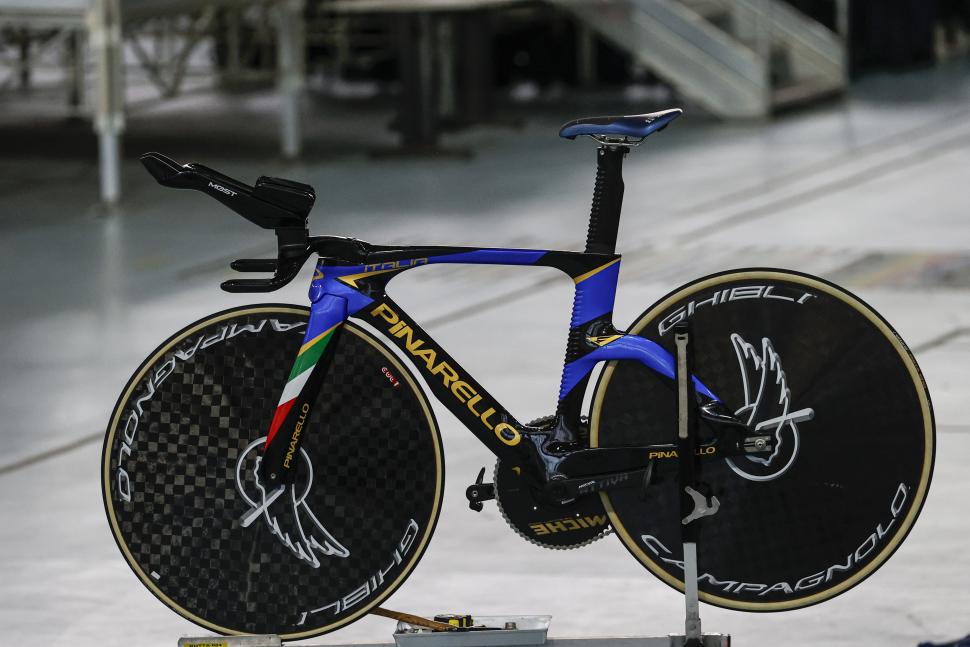 2024 Pinarello Bolide F HR 3D track bike
2024 Pinarello Bolide F HR 3D track bikePinarello's new Bolide F HR 3D track bike is "the fastest bike on earth" and has a £25,000 price tag (for the frame)
Pinarello has launched two updated versions of the Bolide F HR track bike, ridden by Filippo Ganna during his hour record-breaking performance. The Bolide F HR 3D (€28,750 for the frameset) and Bolide HR C (€12,500 for the frameset) will be ridden by the Italian men's and women's track cycling teams respectively, at the Paris 2024 Olympic Games. While you might gasp at the price, that's nothing compared to Factor's latest track bike that will be used by Team Australia, which starts from an eye-watering $59,999. Can the Italians still win on their 'budget' - but very fast - bikes, then?
The new track bikes have been around for a few months, and were first tested in competition by the Italian team at the 2023 UCI Track World Championships.
The men's team finished second in the team pursuit behind Denmark, and Filippo Ganna took the victory in the men's individual pursuit, ahead of Ineos Grenadiers' Performance Engineer, Dan Bigham.
Bolide F HR 3D
The Bolide F HR 3D track bike was "the first and fastest high-performance 3D-printed bike ever produced", initially developed for Filippo Ganna's successful hour-record attempt.
Now, it has been updated to a 3D-printed scalmalloy version for the Italian men's endurance squad, the reigning Olympic champions in team pursuit.
Scalmalloy is a high-strength alloy made from scandium, aluminium and magnesium alloy and Pinarello says it was chosen "as its properties allow it to excel under the increased forces and speed the male athletes produce".
The design of the frame takes advantage of the UCI’s decision to remove its 3:1 rule and the frame features airfoil sections on the bottom bracket and wheel hubs that are longer and slimmer which is said to reduce the frontal area.
Recent trends in aero frame design on the track have leaned towards wider forks and seat stays to minimise the drag of the bike and rider, as seen by the track bike that will used by British athletes in the Paris 2024 Summer Olympics. However, Pinarello discovered inconclusive research in this area and as a result, they've opted for a more conventional approach, utilising narrow forks and seat stays to prioritise frame weight reduction.
The seat tube and seat post feature a pattern of AeroNodes (pictured above) which is said to be inspired by the tubercules found on the flippers of humpback whales and claims to "reduce the complex vortexes generated by riders’ leg movements in order to improve airflow".
Will this bike be enough for Italy to secure victory for a second time, ahead of Australia riding the Factor track bike, which comes with a price tag of a whopping $59,999 (~£47,400) or Team GB with their latest Lotus bike priced at £55,000? The figures attached to the latest wave of pro-level track bikes are hard to fathom, so it will be intriguing to see if money really does talk when it comes to medals in Paris this summer.
Bolide HR C
> Do the latest track bikes favour wealthier nations, and how will the UCI respond?
The men's Bolide F HR 3D and women's Bolide HR C appear very similar, with the only noticeable visual distinction being the colour of the Pinarello decals - gold for the men's and white for the women's model.
However, another significant difference is that while the men's model uses scalmalloy and is 3D-printed, the women's Bolide HR C frame is lighter and crafted from carbon fibre, which "allows the female athletes to get up to speed in the fastest possible time". We can only assume the carbon construction was significantly less costly than the scalmalloy and 3D-printing, because the HR C is a snip at €12,500 compared to the HR 3D priced at €28,750.
The Bolide F HR 3D and HR C will be ridden by Italy's Team Pursuit squads, with Fausto Pinarello saying: “We have invested a lot to produce six 3D-printed scalmalloy bikes for the male riders and six carbon fibre versions for the women (including three separate sized moulds).
"Our hope is that the men will defend their Olympic title on the track this summer and our super-strong women’s team also succeed in their quest for gold. We’ve done everything we can to give them the best-possible chance."
Geometry
Both of the frames share the same geometries as the original Bolide F HR 3D, and are available in three frame sizes.
The Bolide F HR 3D and Bolide HR C will be offered in black titan and carbon black and are priced at €28,750 (~£24,600) and €12,500 (~£10,700) respectively, and are available to buy now if you have the cash. We'll take a couple of each...
Emily is our track and road racing specialist, having represented Great Britain at the World and European Track Championships. With a National Title up her sleeve, Emily has just completed her Master’s in Sports Psychology at Loughborough University where she raced for Elite Development Team, Loughborough Lightning.
Emily is our go-to for all things training and when not riding or racing bikes, you can find her online shopping or booking flights…the rest of the office is now considering painting their nails to see if that’s the secret to going fast…
Latest Comments
- cmedred 1 sec ago
From the position of the cyclist when the video starts and the position of the bike later, it looks highly unlikely that the cyclist went "into the...
- Rendel Harris 6 min 12 sec ago
To rhyme with design. I wondered this myself so looked it up a while ago, according to the founder Micki Kozuschek he and his team had a few...
- Rendel Harris 59 min 24 sec ago
It's not being pedantic at all, careless driving is successfully prosecuted (and I have been in court more than once when a driver has been...
- HLaB 1 hour 22 min ago
It's hopefully an urban myth but I heard it was designed that way on purpose, so the cyclepath captured any flooding and the busway would remain clear
- mdavidford 1 hour 25 min ago
I should imagine eating chopsticks anywhere could be potentially rather perilous.
- Rendel Harris 1 hour 43 min ago
When The Badger stopped for protesters (albeit dockworkers rather than farmers) it was their stress gauges rather than his that would have been...
- Eurodolphin 2 hours 29 min ago
Having experienced a brain injury (while my helmet only suffered a little crack) I welcome all this excellent research which looks for ways to...
- mattw 2 hours 32 min ago
Nope. Has anyone ever bought a wheel trim studded with diamonds for their car? Thought not.
- David9694 2 hours 55 min ago
Dad of William Brown Jr battles Folkestone Town Council over illuminated sign featuring late son’s picture...
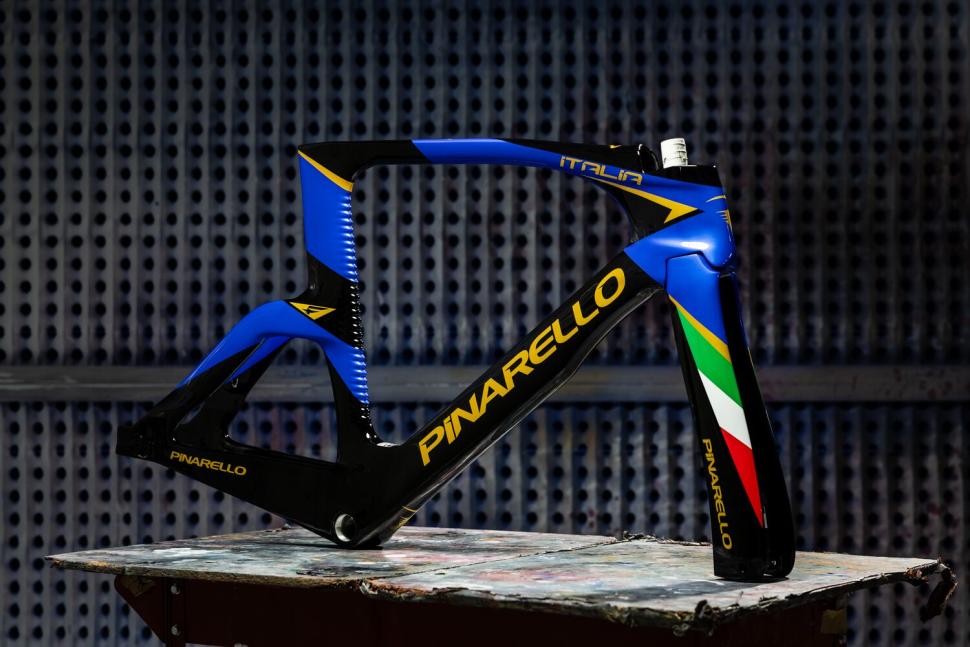
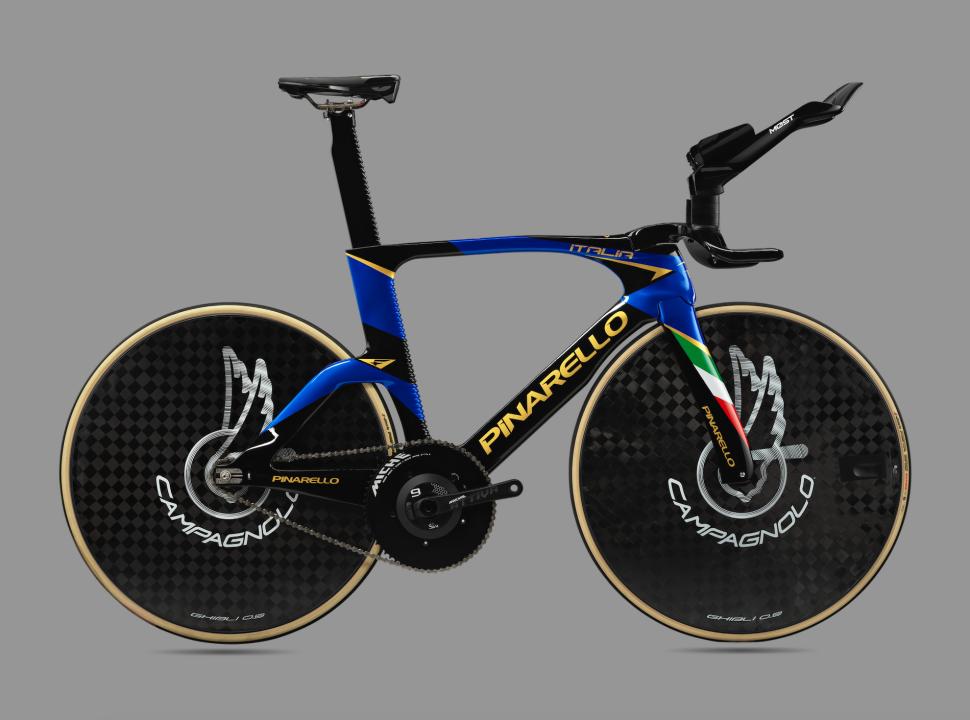
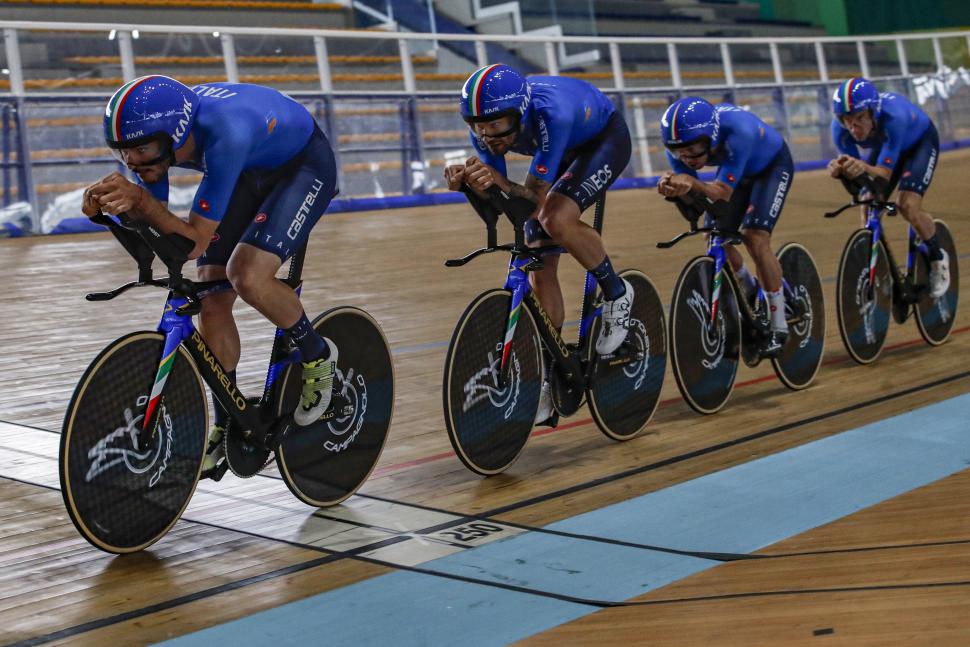
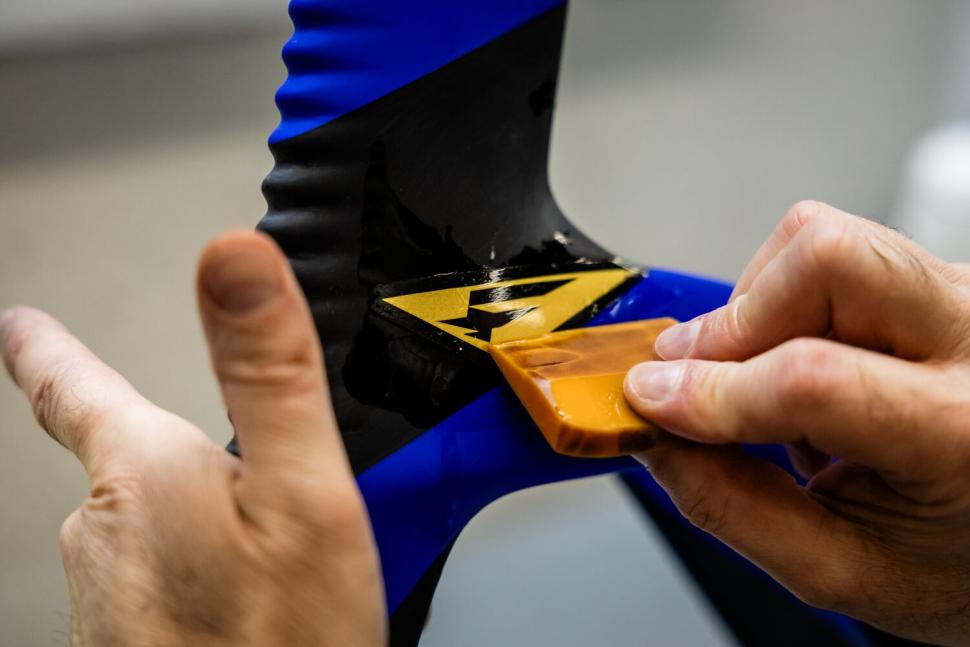
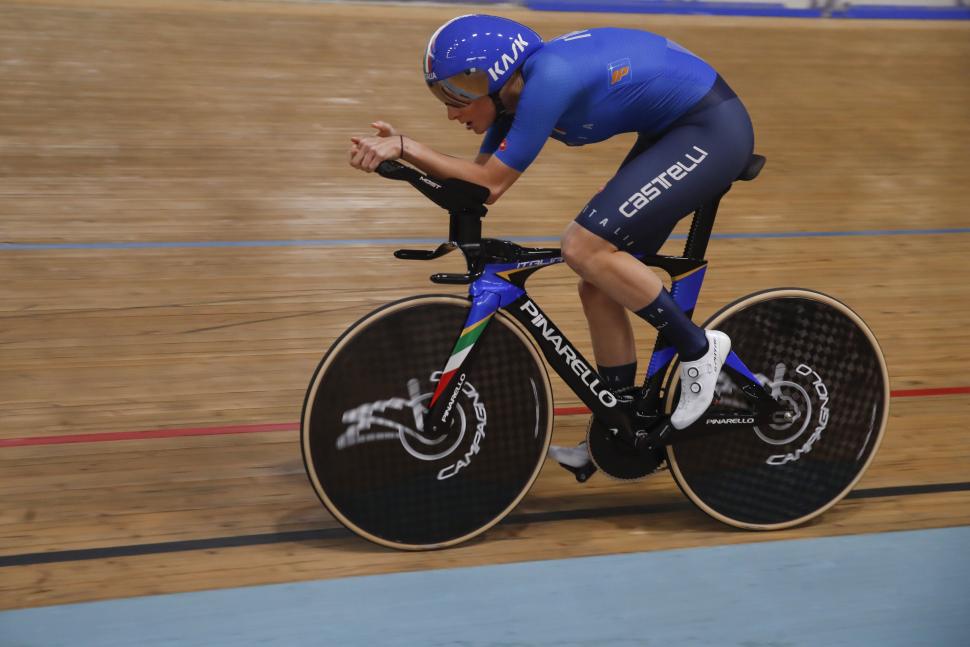
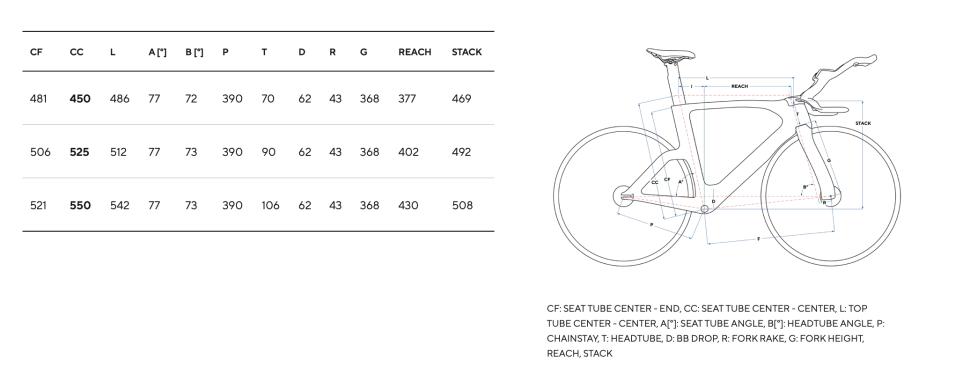
Add new comment
26 comments
That top picture of the team really does hammer home the skills and trust involved in riding a TT bike on a banked circuit at 40+mph, centimetres from the wheel of your team-mate, and no brakes...
People please stop this madness...
What madness are you referring to?
Its all very well, but there's nowhere to mount mudguards or panniers.
No brake caliper holes on the fork or bridge on the rear, never mind cable routing. How do they expect these to sell these to the road-going fixed-gear market?
Narrow, non-standard dropout spacings too. Good luck fitting a Rohloff or a dynamo hub.
Will it take a basket? I like to make progress with a stylish wicker number and (on the down-low) I think it improves my aerodynamics.
As ever, isn't it amazing how the wealthiest nations are also 'the best' at track cycling.
"The figures attached to the latest wave of pro-level track bikes are hard to fathom".
I think it's pretty clear the brands making these bikes have no interest in mere mortals buying these frames. They just pick an imaginairy, deliberately stupid high number as the price, so they officially play by the 'it's available to the public' rule but don't have to actually produce and support them for anyone other than their sponsored riders.
Well, as the men are all getting the best bike and the women the half-price version you're not giving the women the best possible chance, are you?
I'm not an expert and without going down a gender rabbit hole, but I'm guessing the men can produce more power than the woman hence them trying out/using new materials and technologies to produce the frames available to the men that can withstand the power they produce. Whilst the frames available for the women's team are already suitable and optimised for the power that they can produce using existing technologies and material. A lot of the extra costs will be from R and D.
Fair points. I'd be interested to see comparative testing that showed women wouldn't do any better on the super-expensive version though.
I suspect the material choice is 100% down to the 3D printing system being used for the men. I.e., this is the only one both 3D printable and strong enough for a men's bike frame.
I think the price is mostly academic, they won't be selling many (or any even), the price exists so they're technically "for sale" thereby not falling foul of Article 1.3.006. You'll recall that the black unbranded British Cycling UKSI "secret squirrel club" bikes years ago had a notional price tag of over £100k in order to satisfy the UCI, I'll bet they didn't sell a single one.
Like with all sports, a lot of women's national cycling teams have been subjected to horrendous misogyny and inequality (cough Brailsford cough), but in this case the stronger vs lighter rationale does make intuitive sense.
I would have also liked to see this explained. Given them the benefit of the doubt with rose tinted glasses I am wondering if the higher speed the men do mean that the aerodynamics of the more expensive bike work better/make more impact.
I hope it had been analaysed and found the women will be FASTER on the other bikes rather than just they've given 'worse' bikes because they are women.
The best technology (and money) goes to the category with the best results. There is more money poured into MotoGP than in Moto2.
At the last major international track championships, the Europeans in January, Italy's women took gold, so they are producing pretty good results.
No I mean between men and women. Italy is a team, women and men, different categories.
Yes, I know, you said the best technology and money goes to the category with the best results and I am pointing out that the Italian women are achieving very good results and so that would not be a reason not to provide them with the best technology.
Is there any reason to assume the women aren't being provided with the best technology?
Well, as discussed above possibly the women aren't getting the new technology because it's not best suited to them, but the fact that the men are getting bikes that cost twice as much as those supplied to the women does at least make one wonder whether there is as much investment in their machines as there is in the men's.
Investment by whom though? If Pinarello is offering a very expensive bike that works for men and a less expensive bike that works for women, who is at fault? Pinarello? Or the Italian federation (or whoever is responsible for the riders' equipment)?
Yes that makes sense too, as good teams in the same categories are treated with better budgets.
But in the more popular categories where performance is better, there are higher budgets too, unless we are discussing events like LFL where popularity, thus budgets can be high too, but probably for other reasons.
I was pleased to see ITV are showing live MotoGP.
There's an interesting article on the BBC website regarding equipment supply / design for women against that for men - although nothing mentioned about cycling.
https://www.bbc.co.uk/sport/68542035